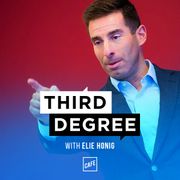

Photo: Kevin Dietsch/Getty Images
I’m trying to imagine how I would have reacted if, back when I was a supervisor at the Southern District of New York, another prosecutor had come to me with this pitch:
We’ve got this case on a guy who had a gun almost five years ago. He was a drug addict at the time, and he lied about that when he filled out some forms to buy the gun. He had the gun for 11 days, nobody ever fired it or used it to do anything, and it wound up getting tossed in a trash can. The guy has had major drug issues and ugly familial problems, but no prior convictions.
I would have had two immediate questions.
First: What’s the crime? Second: Don’t we have better things to do?
I refer, of course, to the criminal trial of Hunter Biden, 54-year-old son of the 46th president of the United States, currently underway in federal court in Delaware. This is the first of two pending Hunter Biden cases brought by DOJ Special Counsel David Weiss (neither of which, it bears noting, has anything to do with the defendant’s father).
The “other” case (for now, though it’ll become more prominent when it proceeds to trial this fall) alleges that Hunter Biden fraudulently evaded over $1.4 million in federal income taxes. That case, in federal court in California, appears to be reasonably well grounded in the evidence and is, in my view, a sound exercise of prosecutorial discretion. But the Delaware gun case: not so much.
As to my first question above — yes, it is a federal crime for an addicted person to possess a gun. But in all honesty, I had never heard of this law throughout my 14 years as a prosecutor until the Hunter Biden case dropped last year.

The Third Degree With Elie Honig
Subscribe on:
Federal law criminalizes possession of firearms by certain classes of “prohibited persons.” The most commonly charged of these categories, by far, applies to convicted felons. We churned out these cases in our first-year unit at the SDNY. Typically, an NYPD officer grabbed somebody on a drug rip or traffic stop, found a gun, ran the rap sheet, and saw that the guy had a prior conviction. Draft it up, “felon-in-possession,” Section 922(g)(1), done and done. (These cases often proved to be trickier than you might expect, especially if the cop found the gun near but not quite on the person — on the sidewalk nearby or in the center console of a car, for example. We’d lose a lot of these at trial.)
After convicted felons, the list of prohibited categories gets narrower and, in some instances, fuzzier: fugitives from justice; anybody who “has been adjudicated as a mental defective” (I’m quoting the statutory language here); any “alien who is illegally or unlawfully in the United States”; anyone who has been dishonorably discharged from the military; and — our category of focus here — any person “who is an unlawful user of or addicted to any controlled substance.” It’s also a crime to lie on federal firearms forms, as Biden seemingly did when he claimed he was not an addict.
By mechanical application of facts to law, Biden appears, quite plainly, to be guilty. There’s no question he was addicted to drugs back in 2018 during the relevant time frame. He’s written as much in his book, and there’s plentiful corroborative evidence of the same, including contemporaneous texts about his addiction and testimony from several of Biden’s romantic exes. Same goes for his possession of a firearm. It’s all but admitted, accepted as fact.
It’s tough to tell at this moment what the defense will be. The defense team surely will encourage the jury to engage in a bit of nullification — essentially, voting to acquit as a matter of politics or protest, regardless of the evidence. That could resonate in Delaware, where the Biden family is Mid-Atlantic royalty. As for the evidence itself, defense counsel suggested in his opening statement that Biden might not have acted “knowingly,” but it’s unclear how he couldn’t have known he was an addict who had a gun. Perhaps the defense will argue that the term addict is vague or that Biden wasn’t an addict at the very moment he filled out the form and obtained the gun. It’s a tight squeeze.
So you’re surely wondering, If he’s obviously guilty, why shouldn’t prosecutors bring charges? That brings us to the second question posed above, the why of it. The answer, in short, is that this is a penny-ante case that rests on a shaky legal foundation and a who-cares set of facts.
Prosecutors do not, and should not, mechanically charge every case that meets the statutory definition of a crime. We’re not automatons. Rather, we need to ask a series of prudential questions. Is this case worth our valuable but limited time and resources? Do we need to bring these charges to protect the public? Is there some broader deterrent message or policy goal we need to promote here? When it comes to a gun that was never used and wound up in a garbage can five years ago, where the defendant has no prior criminal history and poses no present threat to public safety, and where the charge would invoke a semi-obscure crime, we can reasonably answer “no” on all of those.
There’s evidence that Weiss himself recognizes that this particular case lacks heft. Last summer, DOJ prosecutors walked into a federal courtroom in Delaware and were minutes away from finalizing a deal that would have disposed of this very gun charge for … nothing, essentially. As part of a broader plea deal, DOJ had agreed to give Biden a deferred prosecution on the gun case (before the deal fell apart because of a separate misunderstanding between the parties). This means that Weiss was willing to allow Biden to resolve the gun charges by doing, essentially, nothing — not even a slap-on-the-wrist plea deal for probation. Rather, under the near-deal, the gun case would simply vanish if Biden kept himself clean.
As to the legal foundation, the “addict in possession” law faces a questionable future. Conservative groups and individual defendants have recently challenged various federal firearms laws on constitutional grounds, with notable successes. One federal appeals court (not the one where Biden’s trial is occurring) ruled in 2023 that the same “addicted persons” prohibition charged in the Biden case is, in some circumstances, unconstitutional. Given the ideology and recent direction of the Supreme Court on the Second Amendment, it would shock nobody if, someday, they strike down the addict provision altogether.
I have no particular personal sympathy or affection for Hunter Biden the individual. He’s a cash-hungry, influence-peddling opportunist. He has made over $11 million by hawking his family’s name in industries where he has zero experience or expertise. His foreign entanglements and family affairs are a mess. His history of addiction merits empathy, but it does not justify years worth of manipulative, self-enriching behavior by an intelligent, full-grown adult of extraordinary means and privilege.
But none of that means ordinary prosecutorial judgment goes out the window. I wouldn’t go so far as to call this case an injustice; let’s save that label for the deepest outrages. But I do take issue with Weiss’s uneven, and at times internally contradictory, prosecutorial decision-making.
Maybe Weiss notches a win here, but it’s not clear that a conviction vindicates any compelling law-enforcement priority. Or perhaps the defense catches a break and convinces the jury to toss out the charges more as a rebuke to prosecutors than an actual exoneration of Biden. Either way, this is the rare case that ultimately won’t do anyone any good.
This article originally appeared in the free CAFE Brief newsletter. You can find more analysis of law and politics from Elie Honig, Preet Bharara, Joyce Vance, and other CAFE contributors at CAFE.com
Source link




